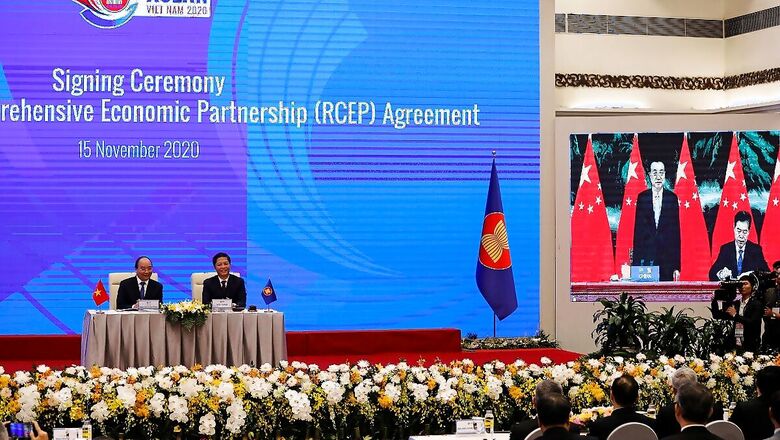
views
The Regional Comprehensive Economic Partnership (RCEP) was agreed upon by 15 member nations, including the 10 ASEAN countries on Sunday. A China-led initiative, the countries agreed to form the world’s largest free trade bloc that accounts for nearly a third of all economic activities and covers almost 30 per cent of the world population or 2.2 billion people.
What is RCEP?
Conceptualized in 2012, RCEP is touted as the largest regional trade agreement aimed at facilitating easier exchange of goods and services among its member nations. Its members include China, Australia, New Zealand, Japan, South Korea and ten ASEAN countries including Vietnam, Laos, Brunei, Cambodia, Myanmar, Thailand, Singapore, Indonesia Malaysia and the Philippines. India was also a part of the bloc until it pulled out last year.
It aims to cut down tariffs, facilitate trade in services and promote investment to enhance growth in the economies of the member nations. It was formed after former US president Barack Obama announced the Trans-Pacific Partnership (TPP), a multinational trade deal, which excluded China.
Why did India withdraw from the pact?
India exited the discussions in November 2019 over concerns regarding the entry of cheaper products from China affecting Indian manufacturers. India already has a $50 billion trade deficit with China and the added competition would have hurt the indigenous industries, especially in the textile, agriculture and dairy sectors. The RCEP signatories have expressed hope that India would join the bloc in the future.
What does it mean for India?
India already has bilateral trade agreements with many of the countries in the bloc. But there is a worry that the members of the RCEP would prefer to deal with other countries within the bloc. This way, India could potentially miss out on a larger market.
What does RCEP entail?
The benefits of the pact include tariff reduction in at least 92 per cent goods among the member countries. The pact will also bring simplified customs procedures and about 65 per cent of the service sector could substantially increase foreign funding limits. The trade deal will also likely result in a reduction in prices of goods for the consumers, owing to enhanced competition. RCEP could prove to be very crucial for the economies reeling from the Covid-19 pandemic.
Read all the Latest News, Breaking News and Coronavirus News here













Comments
0 comment